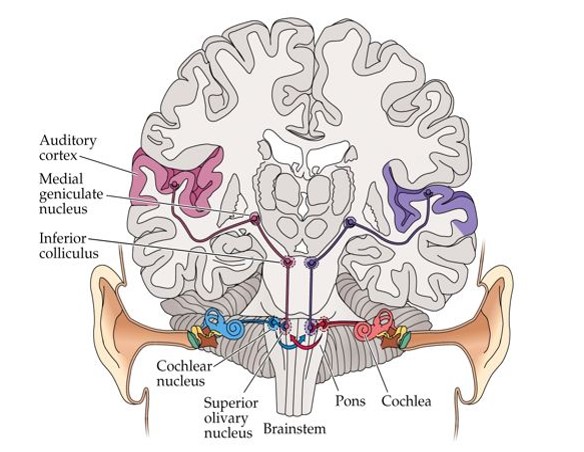
TINNITUS MANAGEMENT
At Golden Ears Audiology Clinic, we provide tinnitus Management which includes:
– Sound Therapy
– Hearing aids
– Tinnitus counselling – CBT/TRT
Did you know?
Your brain is constantly on the alert for potential danger. Any unexpected sensory stimulus such as a movement in your peripheral vision or a sudden noise, can trigger your brain to react against a possible threat.
This reaction is called HYPERVIGILANCE
When the suspected threats turn out to be false alarms, in most cases, the brain quickly learns that the sound is not a threat. It then relaxes hypervigilance and the sensory stimulus (sound) is gradually screened out of awareness through a process called HABITUATION.
Habituation explains why people routinely stop noticing annoying noises (Tinnitus) after prolonged exposure.
When the brain judges tinnitus, as a threat to ones wellbeing, it puts the body on alert.
TINNITUS DISTRESS is your brain sounding the alarm about a perceived possible danger.
Tinnitus Management costs £79 and follow ups at £59
Frequently Asked Questions
Is there a cure for tinnitus?
People want to know if tinnitus be cured. The premise of medical treatment is to medically or surgically resolve any active disease processes. If there is an active disease process that causes the tinnitus and we can eliminate it, then yes, we have cured the tinnitus. There are issues that can be treated medically or surgically that will make it go away.
What is Sound Therapy?
Sound therapy relies on the use of masking sounds to suppress the spontaneous nerve activity underlying tinnitus.
When there is less sound coming into the auditory system, it turns its GAIN up, with the consequence that the spontaneous nerve activity is also amplified, potentially leading to tinnitus.
When sound is provided, e.g. by a hearing aid or a sound generating device, the benefit is that the central gain, which works on both spontaneous and stimulus-driven nerve activity, is turned down and amelioration of the tinnitus may result.
Do hearing aids help with tinnitus?
Amplification provides masking in the frequency range of tinnitus, especially if the hearing aids have a good high frequency response, and in addition it allows brain plasticity to play a role.
What is Audiologist based CBT?
CBT uses a psychological approach that treats tinnitus within a cognitive behavioural model.
It is believed that emotional aspects interfere with the tinnitus habituation process. In this treatment approach, tolerance to tinnitus will be facilitated by reducing levels of autonomic nervous system arousal, changing the emotional meaning of the tinnitus, and reducing other stresses.
What is Tinnitus Retraining Therapy (TRT)
TRT involves the use of directive counselling and sound generators.
TRT proposes that the process of increased auditory gain within the auditory system during periods of restricted sound input, or as a consequence of cochlear damage, may account for the emergence of tinnitus.
The key assumption in TRT is that tinnitus becomes problematic because of the improper activation of the brain’s limbic system, which plays a role in emotion, memory and learning.
Why is tinnitus bothersome for some people and in others it does not affect them?
A person’s emotional response to tinnitus that determines the course of habituation.
An emotional response to tinnitus, that consists of resisting and bracing against tinnitus maintains hypervigilance by reinforcing the brain’s perception that tinnitus is an imminent threat, an “intruder” that must be closely monitored. Rather than learning to ignore tinnitus, the persistently hypervigilant brain is locked into a negative pattern that maintains emotional distress and prevents habituation.
What is habituation?
Short Description
” The handicap associated with Tinnitus can arise from any combination of stress, anxiety, depression, emotional distress, insomnia, difficulties concentrating, or impairments in quality of life or everyday functioning. “

